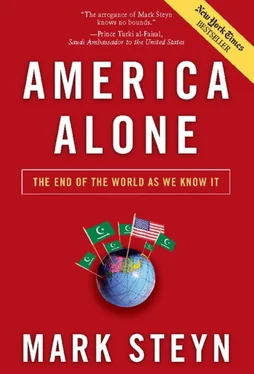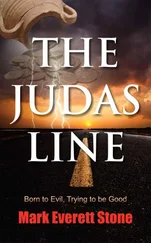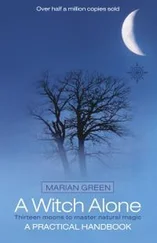But the fact remains: Europe is dying and America isn’t. Europe’s system doesn’t work and America’s does, just about.
So here’s a radical thought for Will Hutton and the Europeans: instead of calling for America to “join the world,” why not try calling on Europe to rejoin the real world?
Otherwise, you’ll be joining what we used to call “the unseen world.” Or here’s an even more radical thought: why doesn’t “the world” try joining America?
That sound you hear is Will Hutton, Jacques Chirac, and the Belgian cabinet rolling on the floor howling with laughter.
Part II
ARABIAN NIGHT
BELIEVERS, CONVERTS, SUBJECTS
Chapter Four
Flying the Coop
BIG MO VS. BIG MAC
People in Najd at that time lived in a condition that could not be approved by any believer. Polytheism had spread widely; people worshiped domes, trees, rocks, caves, or any persons who claimed to be Awliya (saints). Magic and soothsaying also had spread. When the Shaikh saw that polytheism was dominating the people and that no one showed any disapproval of it or no one was ready to call people back to Allah, he decided to labor singly and patiently in the field. He knew that nothing could be achieved without Jihad, patience and suffering.
SHAIKH ABDUL AZIZ IBN ABDULLAH IBN BAZ,
IMAAM MUHAMMAD IBN ABDUL WAHHAB — HIS LIFE AND MISSION (1996)
In 2005, I had lunch with someone who’d just bought a photograph of Abraham Lincoln’s second inaugural. “There they all are,” he said. “Look.” And he pointed to a vaguely familiar figure in the crowd just a few feet from the president: John Wilkes Booth. And then his finger zipped over the photo, picking out the other conspirators standing around Lincoln and already well advanced in what was then a plot merely to kidnap him. March 4, 1865, a rainy Saturday in Washington, and the chief of state is giving his speech unaware that he’s in the last six weeks of his life and that he’s surrounded by the group of men who will end it.
Proximity is all. If they can’t get to you, they can’t get you. Most of us locate our fears on the far horizon — like the old maps where the known world dribbles away and the cartographer scrawls “Here be dragons.” Sometimes, as Lincoln learned, the problem’s right there standing next to you.
A couple of weeks after seeing that photograph, I was passing through London and discovered that Britain was in the grip of bird flu fever: any minute now there would be toxic cockatoos over the white cliffs of Dover, and the East End would be reeling under a blitzkrieg of sneezing parakeets. Those less easily panicked argued it was nutty and way out of proportion, One Flu Over the Cuckoo’s Nest stuff — business as usual from a government that spent the years after September 11 warning of chemical attacks on the Underground and Saddam nuking the British bases on Cyprus. Avian flu? Just the usual Tony Blairy phonyscary rigmarole. But then again, the Tube did eventually get bombed: just because the government says something will happen doesn’t mean it won’t. In rural China pigs are valued possessions and sleep in the living room. That’s why hundreds of members of a Catholic charismatic group from New York state had to go into isolation for a hitherto unknown respiratory disease in April 2003. A doctor from SARS-riddled Guangdong province went to a wedding at the Metropole Hotel in Hong Kong, where he managed to infect sixteen other guests with rooms on the same floor, including Kwan Sui Chu, an elderly lady staying there for one night. She flew home to Toronto and died, her death being attributed to a “chest infection.”
Her son Tse Chi Kwai went to Scarborough Grace Hospital and, as is traditional in Canada, was left on a gurney in Emergency for twelve hours exposed to hundreds of people. Lying next to him was Joe Pollack, who was being treated for an irregular heartbeat and whose wife wandered around the wards and came across an eighty-two-year-old man from a Catholic charismatic group. Mr. Pollack, Mrs. Pollack, the octogenarian charismatic, and his wife all died, and their sons infected at least thirty other members of their religious group plus a Filipina nurse, who flew back to Manila and before her death introduced SARS to a whole new country.
The fellow with the irregular heartbeat, the Catholic charismatics, the Filipina nurse: none of these people went anywhere near rural China. They didn’t have to. They were like Lincoln in that photograph: they didn’t know the infected doctor from Guangdong was, metaphorically, standing next to them.
In a globalized economy, the anti-glob mob and the eco-warriors want us to worry about rapacious First World capitalism imposing its ways on bucolic, pastoral, primitive Third World backwaters. But globalization cuts both ways, and the peculiarities of the backwaters can leap instantly to the metropolis just because someone got on a plane. The African mosquito who hitched a ride on a U.S.-bound flight and all by himself introduced West Nile virus to North America is merely the high-altitude heir to those flea-bitten rats on the Italian ships homebound from the Orient who brought the Black Death to Europe in the 1340s. That too was a globalization quid pro quo: the Continent’s success in opening up trade with the East also opened it up to disease from the East.
That’s the lesson of September 11: the dragons are no longer on the edge of the map. When you look at it that way, the biggest globalization success story of recent years is not McDonald’s or Microsoft but Islamism: the Saudis took what was not so long ago a severe but peripheral strain of Islam practiced by Bedouins in the middle of a desert miles, from anywhere and successfully exported it to Jakarta and Singapore and Alma-Ata and Grozny and Sarajevo and Lyons and Bergen and Manchester and Ottawa and Dearborn and Falls Church. It was a strictly local virus, but the bird flew the coop. And now, instead of the quaintly parochial terrorist movements of yore, we have the first globalized insurgency. In 2006, Danes reeling from the Muslim world’s cartoon-provoked commercial boycott could only dream of boycotting Islam’s products half so effectively.
As a bleary Dean Martin liked to say, in mock bewilderment, at the start of his stage act: “How did all these people get in my room?” How did all these jihadists get rooms in Miami and Portland and Montreal? How did we come to breed suicide bombers not just in. Gaza but in Yorkshire? In the globalized pre-September 11 world, we in the West thought in terms of nations — the Americans, the French, the Chinese and, insofar as we considered transnational groups, were obsessed mostly with race — whites, blacks, Hispanics. Religion wasn’t really on the radar. So an insurgency that lurks within a religion automatically has a global network. You don’t need “deep cover” as a “fifth columnist”: you can hang your shingle on Main Street and we won’t even notice it. And when we do — as we did on September 11 — we still won’t do anything about it, because, well, it’s a religion, and modern man is disinclined to go after any faith except perhaps his own.
But Islam is not just a religion. Those lefties who bemoan what America is doing to provoke “the Muslim world” would go bananas if any Western politician started referring to “the Christian world.” When such sensitive guardians of the separation of church and state endorse the first formulation but not the second, they implicitly accept that Islam has a political sovereignty too. There is an “Organization of the Islamic Conference”: it’s like the EU and the Commonwealth and the G-8 — that is, an organization of nation states whose heads of government hold regular meetings. It’s the largest bloc on the new UN Human Rights Council, which explains why that pitiful joke of a council does nothing for human rights. Imagine if someone proposed an “Organization of the Christian Conference” that would hold summits attended by prime ministers and presidents and voted as a bloc in transnational bodies. And Islam is also a legal code. There is no “Christian law”: indeed, English Common Law and France’s Napoleonic Code are very different philosophically. So it’s not merely that there’s a global jihad lurking within this religion, but that the religion itself is a political project — and, in fact, an imperial project — in a way that modern Christianity, Judaism, Hinduism, and Buddhism are not. Furthermore, this particular religion is historically a somewhat bloodthirsty faith in which whatever’s your bag violence-wise can almost certainly be justified. And, yes, Christianity has had its blood-drenched moments, but the Spanish Inquisition, which remains a byword for theocratic violence, killed fewer people in a century and a half than the jihad does in a typical year.
Читать дальше












